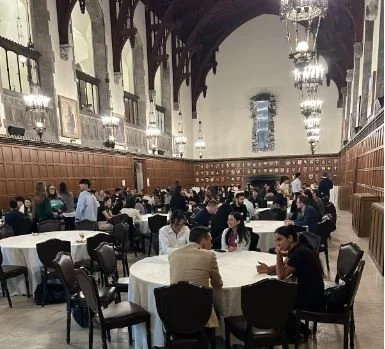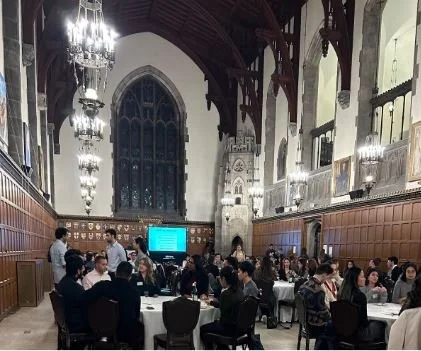Networking Reception Recap
The LSCDS Networking team hosted the LSCDS’ biggest in-person event in 3 years, the Networking Reception, on February 8th at Hart House. The Networking Reception provides graduate students the opportunity to connect with industry leaders and learn more about various career paths available within many different sectors. The in-person aspect of the Networking Reception facilitates organic and meaningful interactions with professional guests and aids in the development of impactful career exploration. The event brought together 121 graduate students and postdocs, as well as 29 industry professionals (in a ratio 4:1) from industries including pharma and biotech, consulting, government and scientific communication.
The concept of networking during your graduate studies can seem a bit daunting to some students. Where do I start? What should I do? How do I make this worthwhile? No matter how independent you want to feel in your journey throughout your degree, collaboration and teamwork are critical to scientific innovation. It is highly critical to also develop interpersonal skills through the practice of networking which is directly relevant to a teamwork oriented mindset and overall success as a scientist. Many studies have shown that interpersonal skills matter more than technical skills, regardless of the job situation (1). In addition to its usefulness in helping you navigate current and next steps in your career, networking is an essential skill that can be helpful for CV building, publishing, and collaboration (2). Networking is simply another skill that if cultivated properly, can be a powerful tool for career success.
An event like the LSCDS Networking Reception provides a valuable opportunity to start or continue to build your scientific network. Following the discussions with multiple industry professionals throughout the evening, these were some of my key takeaways about networking and career decisions:
Emphasis on soft skills vs. technical skills: Working in a team, presentation and communication are all essential for success. You learn lots of skills that are specific to your role on the job, so do not be intimidated by the technical skill fit that companies are asking for!
Some people are very willing to help you, which might get you your first job: Even though everyone has a slightly different career path, many professionals mentioned that their initial position out of graduate school came from a connection they already had in their network instead of an open job application. Not everyone will answer your email and messages in a timely manner, or even answer them at all. However, some kind individuals are willing to pay it forward and show interest in helping current graduate students who seek guidance.
Informational interviews are important: They can give you insight into the detailed requirements for positions in a company, and provide a contact in your network for future inquiries about open positions. Build up that LinkedIn network!
If you missed out on our reception, it’s not too late to get started with your personal networking journey. If you would like to learn more about how to get the most out of graduate experience by actively networking and engaging in student initiatives, watch our fifth “LSCDS Speak” podcast episode, “The three phases of networking”, with Dr. Anne Meyer-Miner, a scientific recruiter at STEMCELL technologies. All of our episodes in the series can be found on the LSCDS website.
We also have other great upcoming events for your networking needs. The next Mini-Networking Night will be held on April 13th. Additionally, the Life Science Career Expo is a one-stop shop for life science trainees at any and all stages of career exploration. For all other LSCDS news, check out our calendar to learn about and register for our future events. Don’t forget to also follow us on our social media – LinkedIn, Instagram, and Twitter!
Photo credits: Jon Lacanlale (LSCDS Networking Team co-Lead).

